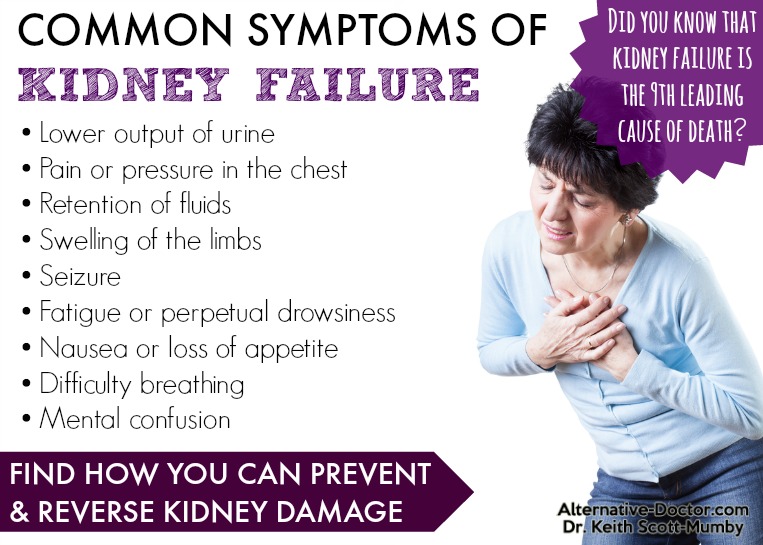Did you know that kidney (renal) failure is officially the ninth leading cause of death?
Renal failure occurs when your kidneys are suddenly unable to filter waste matter from your blood. Dangerous toxins build up quickly in your system and result in acute kidney failure in as little as a few days. There have been cases that have advanced to the critical point within hours!
Once your kidneys reach end-stage renal failure, you will be unable to survive without a transplant or long-term dialysis (mechanical device that filters your blood for you).
There may be no symptoms of kidney failure until lab work is done for another condition. If you do experience symptoms, it is crucial that you immediately seek medical attention.
When your kidneys fail – truly fail – your options are severely limited. The need for kidneys far outweighs the available supply.
Common Symptoms of Kidney Failure
- Lower output of urine
- Pain or pressure in the chest
- Retention of fluids that results in swelling of the limbs
- Seizure
- Fatigue or perpetual drowsiness
- Nausea or loss of appetite
- Difficulty breathing
- Mental confusion
Who is at Risk for Kidney Failure?
Acute kidney failure is typically your body’s response to another medical event or condition. If you have a history of kidney, liver, or heart disease, diabetes, are of advanced age, or have been hospitalized for a serious condition (especially for surgical or intensive care), your risk of kidney failure is higher than you imagine.
Risk Factors Include
- Poor lifestyle choices such as obesity, lack of nutrition, and smoking
- Slow or impaired blood flow to your kidneys
- Blood loss (even in surgical conditions)
- Blockages to your kidney drainage tubes (such as kidney stones)
- Long-term use of aspirin, ibuprofen, naproxen, or similar over-the-counter drugs
- Repeated or prolonged dehydration
- Blood clots in or around the kidneys or urinary tract
- Chronic infection and inflammation
- Impact injuries to the kidneys
- Autoimmune disorders such as lupus
- Chemotherapy drugs, imaging test dyes, antibiotics, and osteoporosis drugs
- High-level toxic substances such as illegal drugs or heavy metal exposure
- Excessive alcohol consumption
- Reproductive or endocrine system cancers
Dr. Alex Chang, M.D. with Johns Hopkins University stated, “Unlike family history of kidney disease, diet, smoking, and obesity are modifiable lifestyle factors that we can all control. By eating well, quitting smoking, and maintaining a normal weight, people can protect their kidneys and prevent future damage.”
The results of his kidney disease research was published in the American Journal of Kidney Disease. Dr. Chang and his team determined that people who are obese have double the risk of developing kidney disease and those who smoke are 60% more likely to lose the use of their kidneys.
Before your kidneys go past the point of no return, you need to read my book! Inside the pages of “The Waters of Life,” you’ll learn how to prevent and even reverse kidney disease right now! Without trying to buy someone’s black market organ!
What You’ll Discover Inside
- Kidney disease statistics
- Hidden kidney disease
- Causes of kidney failure
- Nephrotic syndrome (the inflamed, leaky kidney)
- Understanding end-stage renal disease (ESRD)
- Dialysis (and why you don’t want it!)
- Facts about kidney cancer
- Kidney tests explained
- Treatment for kidney disease
- What you should do to look after your kidneys
- How and why to detox safely to avoid damaging your kidneys
- Kidney stones (the myths get busted)
- The “bump and jump” method to dislodge stuck stones
- Preventing recurrence of stones
- Herbs for kidney health
- Homeopathic kidney formulas
- Drink only quality waters (a review of water filters)
I have one final comment and I hope you take it seriously. Do not wait until you are told you have extensive kidney damage. Remember, you won’t know until it’s almost too late! Kidneys are the “silent” killer.
Start today on protecting your body’s filtration system. Pick up your copy of “The Waters of Life” right now!

